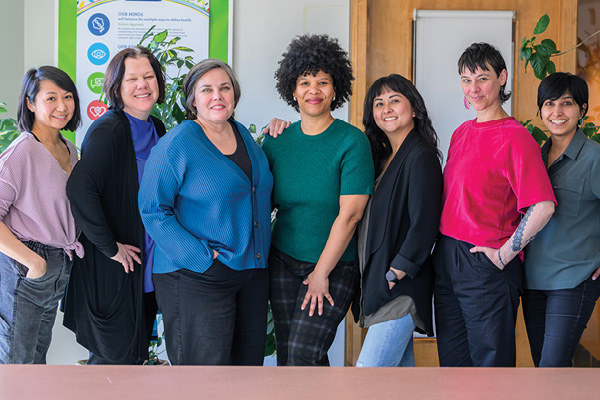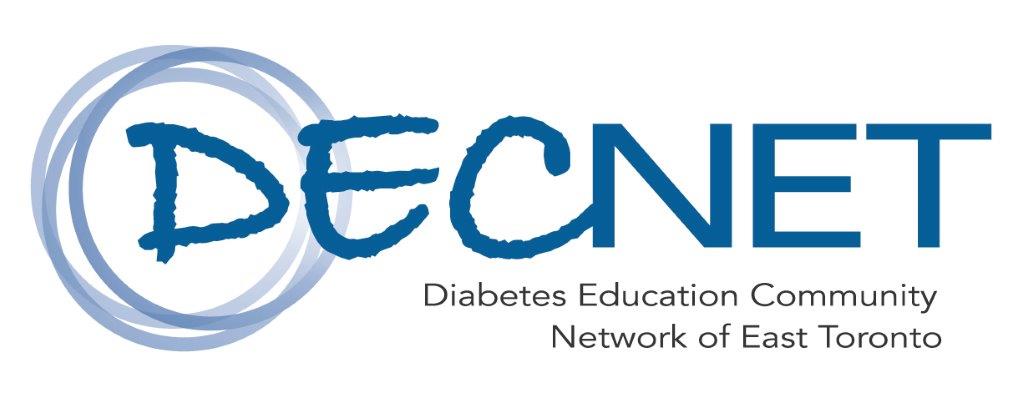The MATCH Program Inspires Collaborative Perinatal Care
SRCHC’s Midwifery and Toronto Community Health (MATCH) Program is committed to facilitating very low barrier access to sexual and reproductive healthcare for people who often face systemic barriers. Our goal is to provide a seamless system of care without discharges where our clients are supported to move from the community to a hospital setting and back, without falling through the cracks. Our strong and positive collaborative relationships with our obstetric, midwifery, internal medicine, endocrinology, nursing, and paediatric colleagues at Michael Garron Hospital (MGH) means people are accessing primary and specialist care that’s well connected and continuous.
In the past year, the MATCH Program provided comprehensive perinatal care, including prenatal, labour, birth, postpartum, abortion, and neonatal care services. The team also offered testing and treatment for sexually transmitted infections (STIs), Pap tests, access to vaccinations during pregnancy, and managed first-trimester complications through MGH’s Outpatient Early Pregnancy Clinic.
This year marked the MATCH Program’s second full year staffing the Early Pregnancy Clinic at MGH, providing 938 unique visits. The midwifery-led clinic provides follow-up care for anyone experiencing first-trimester pregnancy complications, whether referred from the emergency department or their primary care provider. In response to growing demand, we have expanded the clinic from two to three days per week, adding a seven-day-a-week phone line; revamped the website and referral forms; and developed standardized clinical protocols in collaboration with our obstetric colleagues.
For the upcoming year, plans are underway to add a fourth clinic day. To our knowledge, this is the first midwifery-led outpatient early pregnancy clinic in Canada and colleagues in Ottawa and London have reached out to learn how they might implement a similar model of care in their cities.
This year at SRCHC, the MATCH program provided care to 535 unique clients.
68% of our clients were uninsured, 25% were underhoused or homeless, 25% were single parents, and 61% were experiencing food insecurity, which we attempted to mitigate with grocery cards at visits and providing snacks in clinic.

DECNET Increases Access to Primary Care and Reduces Health Inequities
Diabetes Education Community Network of East Toronto (DECNET) breaks down barriers and reduces health inequities for people living with type 2 diabetes or prediabetes. Our multidisciplinary team of nurses, dietitians, social workers, and health promoters work together to provide evidence-based diabetes education to 2,062 unique clients annually. Last year, we received nearly 400 referrals from nurse practitioners and physicans from across East Toronto.
DECNET is committed to providing accessible care to those who need it most. Services are provided at multiple locations and we’re integrated into a number of primary care settings within CHCs and family practices. For people facing barriers to attend in-person visits, we offer transportation support, phone appointments, and occasional home visits. For clients who are uninsured or not connected to a primary care provider, DECNET bridges gaps by coordinating care and assisting clients in navigating the healthcare system.
Living with diabetes affects more than physical health. About 50% of people living with diabetes also experience anxiety from the constant demands of managing the chronic condition.
SRCHC is one of the only diabetes programs in Toronto that has a social worker integrated into the team. This connected approach allows us to offer clients short-term mental health counselling and case management for concerns related to income, housing, immigration, food security and more, addressing the full scope of health and well-being.
DECNET collaboratively engages people and communities impacted by or at risk of type 2 diabetes to optimize their well-being through accessible, equitable, and evidence informed education, self-management support and care.

Diabetes Eye Screening: The First Home Visit
In September 2024, SRCHC celebrated another innovative milestone — our Diabetes Eye Screening Program [DESP] provided its first home visit.
A woman in her 60s who uses a wheelchair was scheduled for an eye screening at our 1245 Danforth Avenue site. At intake, she and her referring physician raised concerns about her mobility and let us know that transportation would be a barrier that could prevent her from accessing our services. Thanks to new research by the University Health Network (UHN) and with the support of AI-based tools, including a state-of-the-art handheld camera, our team was able to bring the eye screening to her home.
We used a Snellen chart to check her vision, administrating dilating drops and capturing detailed images of her eyes using the portable camera. Within a week, a specialist reviewed her results and recommended follow-up care.
By meeting people where they are, we’re doing more than screening eyes for issues – we’re protecting against diabetes-related vision loss and improving access to sight-saving healthcare.
According to Diabetes Action Canada, 31% of Ontarians live with diabetes or prediabetes. Diabetes is the leading cause of blindness in Ontario. For more than ten years, SRCHC has partnered with UHN to provide eye screening to low-income and marginalized people living with diabetes.
DESP is currently the top-performing tele-ophthalmology program in Ontario and has screened approximately 4,600 people since its inception in 2017.
Did you know
For every dollar invested in DESP, the return on investment is $26.95 for screening and low-cost therapy, and $7.66 for screening and high-cost therapy?
